TED经典句子背诵
8-secrets-of-success成功的八个秘诀Ted演讲台词

8-secrets-of-success成功的八个秘诀Ted演讲台词第一篇:8-secrets-of-success 成功的八个秘诀Ted演讲台词Eight secrets of successRichard St.JohnThis is really a two-hour presentation I give to high school students, cut down to three minutes.And it all started one day on a plane, on my way to TED, seven years ago.And in the seat next to me was a high school student, a teenager, and she came from a really poor family.And she wanted to make something of her life, and she asked me a simple little question.She said, “What leads to success?” And I felt really badly, because I couldn't give her a good answer.So I get off the plane, and I come to TED.And I think, jeez, I'm in the middle of a room of successful people!So why don't I ask them what helped them succeed, and pass it on to kids? So here we are, seven years, 500 interviews later, and I'm gonna tell you what really leads to success and makes TED-sters tick.【And the first thing is passion.】Freeman Thomas says, “I'm driven by my passion.” TED-sters do it for love;they don't do it for money.Carol Coletta says, “I would pay someone to do what I do.” And the interesting thing is: if you do it for love, the money comes anyway.【Work!】Rupert Murdoch said to me, “It's all hard work.Nothing comes easily.But I have a lot of fun.” Did he say fun? Rupert? Yes!TED-sters do have fun working.And they work hard.I figured, they're not workaholics.They're workafrolics.【Good!】Alex Garden says, ”To be successful put your nose down in something and get damn good at it.“ There's no magic;it's practice, practice, practice.【And it's focus.】Norman Jewison said to me, ”I think it all has to do withfocusing yourself on one thing.“【And push!】David Gallo says, ”Push yourself.Physically, mentally, you've gotta push, push, push.“ You gotta push through shyness and self-doubt.Goldie Hawn says, ”I always had self-doubts.I wasn't good enough;I wasn't smart enough.I didn't think I'd make it.“ Now it's not always easy to push yourself, and that's why they invented mothers.(Laughter)Frank Gehry — Frank Gehry said to me, ”My mother pushed me.“【Serve!】Sherwin Nuland says, ”It was a privilege to serve as a doctor.“ Now a lot of kids t ell me they want to be millionaires.And the first thing I say to them is: ”OK, well you can't serve yourself;【Ideas!】TED-ster Bill Gates says, ”I had an idea: founding the first micro-computer software company.“ I'd say it was a pretty good idea.And there's no magic to creativity in coming up with ideas —it's just doing some very simple things.And I give lots of evidence.【Persist!】Joe Kraus says, ”Persistence is the number one reason for our success.“ You gotta persist through failure.You gotta persist through crap!Which of course means ”Criticism, Rejection, Assholes and Pressure.“(Laughter)So, the big — the answer to this question is simple: Pay 4,000 bucks and come to TED.Or failing that, do the eight things — and trust me, these are the big eight things that lead to success.Thank you TED-sters for all your interviews!第二篇:TED演讲成功的两大秘诀TED演讲成功的两大秘诀一前期准备工作当我想到要做一个扣人心弦的演讲,在我脑海中浮现的是去带着观众踏上一段旅途。
ted演讲好词好句
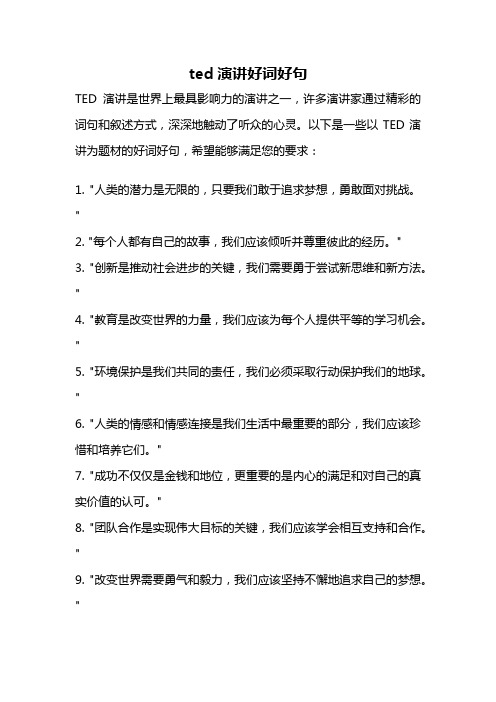
ted演讲好词好句
TED演讲是世界上最具影响力的演讲之一,许多演讲家通过精彩的词句和叙述方式,深深地触动了听众的心灵。
以下是一些以TED演讲为题材的好词好句,希望能够满足您的要求:
1. "人类的潜力是无限的,只要我们敢于追求梦想,勇敢面对挑战。
"
2. "每个人都有自己的故事,我们应该倾听并尊重彼此的经历。
"
3. "创新是推动社会进步的关键,我们需要勇于尝试新思维和新方法。
"
4. "教育是改变世界的力量,我们应该为每个人提供平等的学习机会。
"
5. "环境保护是我们共同的责任,我们必须采取行动保护我们的地球。
"
6. "人类的情感和情感连接是我们生活中最重要的部分,我们应该珍惜和培养它们。
"
7. "成功不仅仅是金钱和地位,更重要的是内心的满足和对自己的真实价值的认可。
"
8. "团队合作是实现伟大目标的关键,我们应该学会相互支持和合作。
"
9. "改变世界需要勇气和毅力,我们应该坚持不懈地追求自己的梦想。
"
10. "多元文化的交流和理解是促进和平与和谐的基础,我们应该尊重和欣赏不同的文化。
"
希望以上的词句能够满足您的要求,同时也能够激发您对TED演讲的兴趣。
ted演讲的经典语录
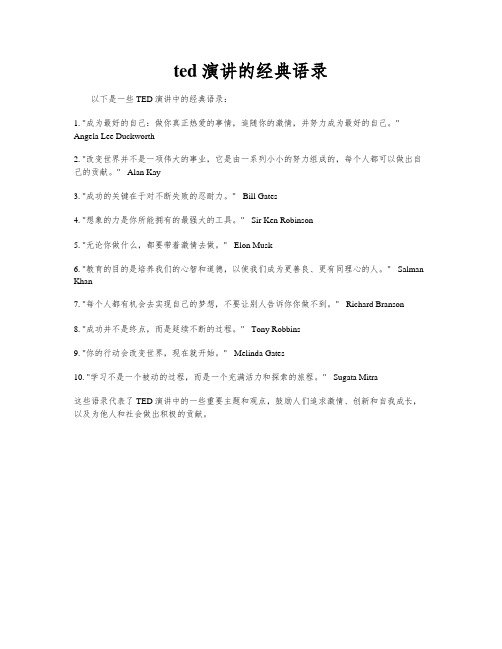
ted演讲的经典语录
以下是一些TED演讲中的经典语录:
1. "成为最好的自己:做你真正热爱的事情,追随你的激情,并努力成为最好的自己。
" - Angela Lee Duckworth
2. "改变世界并不是一项伟大的事业,它是由一系列小小的努力组成的,每个人都可以做出自己的贡献。
" - Alan Kay
3. "成功的关键在于对不断失败的忍耐力。
" - Bill Gates
4. "想象的力是你所能拥有的最强大的工具。
" - Sir Ken Robinson
5. "无论你做什么,都要带着激情去做。
" - Elon Musk
6. "教育的目的是培养我们的心智和道德,以使我们成为更善良、更有同理心的人。
" - Salman Khan
7. "每个人都有机会去实现自己的梦想,不要让别人告诉你你做不到。
" - Richard Branson
8. "成功并不是终点,而是延续不断的过程。
" - Tony Robbins
9. "你的行动会改变世界,现在就开始。
" - Melinda Gates
10. "学习不是一个被动的过程,而是一个充满活力和探索的旅程。
" - Sugata Mitra
这些语录代表了TED演讲中的一些重要主题和观点,鼓励人们追求激情、创新和自我成长,以及为他人和社会做出积极的贡献。
ted语录

ted语录
以下是一些ted语录:
- 地球在快速转动时,状态十分稳定。
但它放慢速度后就会失去稳定性,开始晃动。
如果没有月亮,情况就会是这样。
- 我们靠收集记忆碎片去创造未来的想象。
- 似乎有大量的无意识大脑活动在塑造你的决定,而你的意识在决定中表现得很滞后。
- 现实社会的情况是:成千上万的人们都在平静的绝望中煎熬。
他们夜以继日地从事他们痛恨的职业,目的是为了购买无用的商品,以博得无关痛痒的邻人的艳羡。
- 如果你不规划自己的生活,那么别人就会为你规划,而他们对平衡的处理,你往往并不认同。
所以,要自己承担起选择自己生活轨迹的重任。
- 主动感知你周遭的世界。
- 拥抱内心中那个三岁的自己,意识到让生活美好的那些小小快乐。
- 做真实的自己,心安理得做自己。
- 顺从自己的心意,让自己置身于能让你快乐的事务中。
- 抑郁是爱的缺陷。
如果你跟一个人结婚后想的是:“如果我的妻子去世了我会再找一个。
”据我所知,这不叫爱。
没有哪种爱情,是可以只感受幸福而不体验失去的。
这种绝望的幽灵,会成为亲密关系的动力。
TED︱五个毁灭梦想的想法

TED︱五个毁灭梦想的想法1.I dedicated the past two years to understanding how people achieve their dreams.我花了两年的时间去理解人们如何实现他们的梦想。
2.When we think about the dreams we have, and the dent we want to leave in the universe, it is striking to see how big of an overlap there is说到我们的梦想、我们想要在这个宇宙留下的痕迹,让人吃惊的是3.between the dreams that we have and projects that never happen.我们的梦想常常只是梦。
4.(Laughter) So I'm here to talk to you today about five ways how not to follow your dreams.(笑声)今天我在这里要讲的就是 5个如何毁灭梦想的办法。
5.One: Believe in overnight success.第一:相信一夜成名。
6.You know the story, right?你肯定听过这样的故事:7.The tech guy built a mobile app and sold it very fast for a lot of money.一个技术男开发了一个移动应用并迅速转卖赚了很多钱。
8.You know, the story may seem real, but I bet it's incomplete.这个故事可能是真的,但是很可能是不完整的。
9.If you go investigate further, the guy has done 30 apps before and he has done a master's on the topic, a Ph.D.如果你深入研究就发现,这个人在之前已经开发了30个应用,他有相关的硕士和博士学历,10.He has been working on the topic for 20 years.他研究这个领域已经20年了。
ted演讲经典语录
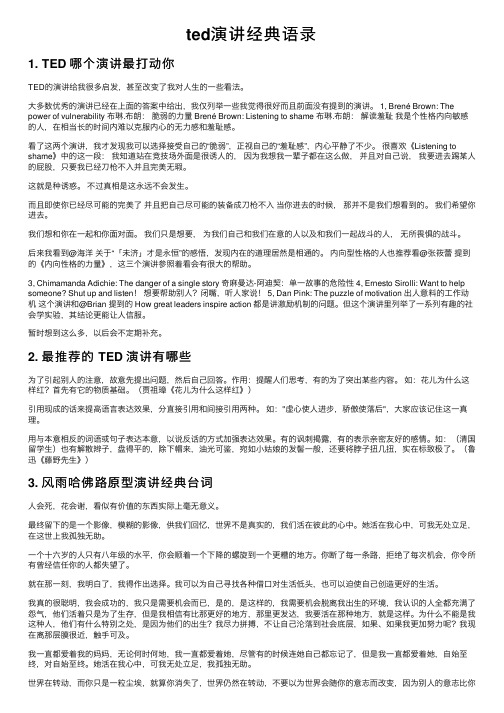
ted演讲经典语录1. TED 哪个演讲最打动你TED的演讲给我很多启发,甚⾄改变了我对⼈⽣的⼀些看法。
⼤多数优秀的演讲已经在上⾯的答案中给出,我仅列举⼀些我觉得很好⽽且前⾯没有提到的演讲。
1, Brené Brown: The power of vulnerability 布琳.布朗:脆弱的⼒量 Brené Brown: Listening to shame 布琳.布朗:解读羞耻我是个性格内向敏感的⼈,在相当长的时间内难以克服内⼼的⽆⼒感和羞耻感。
看了这两个演讲,我才发现我可以选择接受⾃⼰的“脆弱”,正视⾃⼰的“羞耻感”,内⼼平静了不少。
很喜欢《Listening to shame》中的这⼀段:我知道站在竞技场外⾯是很诱⼈的,因为我想我⼀辈⼦都在这么做,并且对⾃⼰说,我要进去踢某⼈的屁股,只要我已经⼑枪不⼊并且完美⽆瑕。
这就是种诱惑。
不过真相是这永远不会发⽣。
⽽且即使你已经尽可能的完美了并且把⾃⼰尽可能的装备成⼑枪不⼊当你进去的时候,那并不是我们想看到的。
我们希望你进去。
我们想和你在⼀起和你⾯对⾯。
我们只是想要,为我们⾃⼰和我们在意的⼈以及和我们⼀起战⽃的⼈,⽆所畏惧的战⽃。
后来我看到@海洋关于“「未济」才是永恒”的感悟,发现内在的道理居然是相通的。
内向型性格的⼈也推荐看@张筱蕾提到的《内向性格的⼒量》,这三个演讲参照着看会有很⼤的帮助。
3, Chimamanda Adichie: The danger of a single story 奇⿇曼达-阿迪契:单⼀故事的危险性 4, Ernesto Sirolli: Want to help someone? Shut up and listen!想要帮助别⼈?闭嘴,听⼈家说! 5, Dan Pink: The puzzle of motivation 出⼈意料的⼯作动机这个演讲和@Brian 提到的 How great leaders inspire action 都是讲激励机制的问题。
TED演讲语段精华整理

TED1 It's one thing to work up (激发)the confidence to write honestly about your experiences with love, but it is another thing to discover that your love life has made international news .2 The moment you admit to loving someone, you admit to having a lot to lose.3 So rather than that question, I would propose we ask some more difficult questions, questions like:How do you decide who deserves your love and who does not? How do you stay in love when things get difficult, and how do you know when to just cut and run? How do you live with the doubt that inevitably creeps into every relationship, or even harder, how do you live with your partner's doubt? I don't necessarily know the answers to these questions, but I think they're an important start at having a more thoughtful conversation about what it means to love someone.------------------------------------------------------------------------------------------------------------ 1What struck (strike使震惊,使迷住)me was that I.Q. was not the only differenceGrit is passion and perseverance for very long-term goals.Grit is having stamina(恒心).Grit is sticking with your future, day in, day out,not just for the week, not just for the month,but for years, and working really hard to make that future a reality.Grit is living life like it's a marathon, not a sprint(短跑). (表达)In fact, in our data, grit is usually unrelated or even inversely related to measures of talent.毅力通常与其他因素无关,甚至与才华的衡量标准背道而驰。
最新-ted演讲稿中英文对照 TED演讲中的句子 精品

ted演讲稿中英文对照TED演讲中的句子Thesecretoftheirextraordinarysuccesslaypreciselyinthatinsatiablecurio sity,thatirrepressibledesiretoknow,nomatterwhatthesubjectandnomatterw hatthecost.他们取得非凡成就的秘密,是他们永不满足的好奇心和难以遏制的求知欲,以及对任何事物不计代价的付出.Liveeachdayasifitisyourlast,(Gandhi)learnasifyou’llliveforever.ThisiswhatI’mpassionateabout.Itisthisinextinguishable,undauntedappetiteforlearnin gandexperience;nomatterhowrisible,nomatterhowesoteric,nomatterhowsedi tiousitmightseem.要活就要像明天你就会死去一样活着(甘地),要学习就要像你将会永生一样学习.这就是我的热情所在,一种对知识和经验的坚定无畏的渴望,而不管这些知识多么荒唐,抑或神秘,或看上去别有用心.2.[安静!保持听力健康的八大法则]Eachofyouanindividualchord,foronedefinitionofhealthmaybethatchordi sinpleteharmony.每个人都是一个独立的和弦.健康的定义之一是令这种和弦保持一种和谐状态.Reductivelisteningistoreduceeverythingdowntowhat’srelevant,anddiscardeverythingthat’snotrelevant.(men)删减性的倾听是有选择的听,只关注想知道的东西而忽略无关紧要的内容(通常男士).Expansivelistening–getnodestinationinmind.It’sjustenjoyingthejourney(womentypically).扩展性的倾听——无明确目标的倾听,只是享受听的过程(通常女士).Threequicktipstoprotectyourears:三种保护听力的简单方法:①Professionalhearingprotectors专业听力保护器②Headphonesofthebestkindyoucanafford买你能买得起的最好耳机③Wheninbadsound,putyourfingersinyourearsorjustmoveawayfromit.听到噪音时,最好用手指护住耳朵,或者远离噪音;Languageasdecoratedsilence.语言即经修饰过的宁静.Wind,water,birds–naturalsound–。
【优质】ted演讲经典语句-推荐word版 (19页)
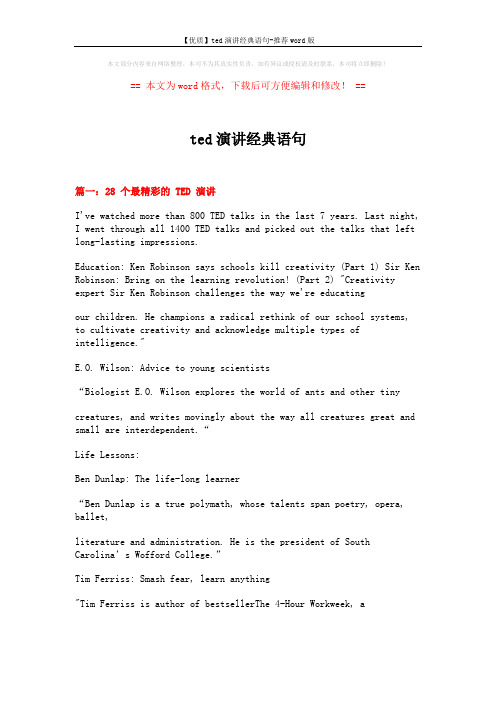
本文部分内容来自网络整理,本司不为其真实性负责,如有异议或侵权请及时联系,本司将立即删除!== 本文为word格式,下载后可方便编辑和修改! ==ted演讲经典语句篇一:28 个最精彩的 TED 演讲I've watched more than 800 TED talks in the last 7 years. Last night, I went through all 1400 TED talks and picked out the talks that left long-lasting impressions.Education: Ken Robinson says schools kill creativity (Part 1) Sir Ken Robinson: Bring on the learning revolution! (Part 2) "Creativity expert Sir Ken Robinson challenges the way we're educatingour children. He champions a radical rethink of our school systems, to cultivate creativity and acknowledge multiple types of intelligence."E.O. Wilson: Advice to young scientists“Biologist E.O. Wilson explores the world of ants and other tinycreatures, and writes movingly about the way all creatures great and small are interdependent.“Life Lessons:Ben Dunlap: The life-long learner“Ben Dunlap is a true polymath, whose talents span poetry, opera, ballet,literature and administration. He is the president of South Carolina’s Wofford College.”Tim Ferriss: Smash fear, learn anything"Tim Ferriss is author of bestsellerThe 4-Hour Workweek, aself-improvement program of four steps: defining aspirations, managing time, creating automatic income and escaping the trappings of the 9-to-5 life."Terry Moore: How to tie your shoes"Terry Moore is the director of the Radius Foundation, a forum forexploring and gaining insight from different worldviews."JJ Abrams: The mystery box"Writer, director and producer J.J. Abrams makes smart, addictivedramas like TV's Lost, and films like Cloverfield and the new Star Trek."Performance: Kenichi Ebina's magic moves “Self-taught dancer Kenichi Ebina blends hip-hop, martial arts, moderndance, magic and a blast of pop culture in his mesmerizing performances.”Rives: If I controlled the Internet …"Performance artist and storyteller Rives has been called "the first 2.0poet," using images, video and technology to bring his words to life."Science:Aubrey de Grey: A roadmap to end aging"Aubrey de Grey, British researcher on aging, claims he has drawn aroadmap to defeat biological aging. He provocatively proposes that the first human beings who will live to 1,000 years old have already been born."Elaine Morgan says we evolved from aquatic apes"Elaine Morgan is an octogenarian scientist, armed with an arsenal oftelevision writing credits and feminist instincts, on a mission to prove humans evolved in water."VS Ramachandran: 3 clues to understanding your brain"Neurologist V.S. Ramachandran looks deep into the brain’s most basicmechanisms. By working with those who have very specific mental disabilities caused by brain injury or stroke, he can map functions of the mind to physical structures of the brain."Stephen Petranek counts down to Armageddon“When he was editor-in-chief ofDiscover magazine, Stephen Petranektangled with questions as big as the universe. Here he confronts the biggest question on the planet: What are the 10 most likely ways that life on the Earth could end?”Society: Simon Sinek: How great leaders inspire action"In 201X, Simon Sinek released the book "Start With Why" -- a synopsis of the theory he has begun using to teach others how to become effective leaders and inspire change."Derek Sivers: How to start a movement"Through his new project, MuckWork, Derek Sivers wants to lessen theburdens (and boredom) of creative people."Jane McGonigal: Gaming can make a better world"Reality is broken, says Jane McGonigal, and we need to make it workmore like a game. Her work shows us how."Temple Grandin: The world needs all kinds of minds"Through groundbreaking research and the lens of her own autism,Temple Grandin brings startling insight into two worlds."Seth Godin: How to get your ideas to spread"Seth Godin is an entrepreneur and blogger who thinks about themarketing of ideas in the digital age. His newest interest: thetribes we lead."Jonas Eliasson: How to solve traffic jams“Jonas Eliasson is dedicated to researching transportation flow, analyzing how people think about their commutes and what can influence their travel decisions.”Larry Lessig: Laws that choke creativity"The U.S. Congress is broken, and law professor and legal activistLawrence Lessig wants you to help him fix it. In "Republic, Lost," he tells you how."Malcolm Gladwell: Choice, happiness and spaghetti sauce"Detective of fads and emerging subcultures, chronicler of jobs-you-never-knew-existed, Malcolm Gladwell's work is toppling the popular understanding of bias, crime, food, marketing, race, consumers and intelligence."Jason Fried: Why work doesn't happen at work"Jason Fried thinks deeply about collaboration, productivity and the nature of work. He's the co-founder of 37signals, makers of Basecamp and other web-based collaboration tools, and co-author of Rework."Entrepreneurship: Thulasiraj Ravilla: How low-cost eye care can be world-class "Thulasiraj Ravilla is the executive director of the Lions Aravind Instituteof Community Ophthalmology, helping eye-care hospitals around the world build capacity to prevent blindness."Amos Winter: The cheap all-terrain wheelchair”Amos Winter and his team at MIT built the Leveraged Freedom Chair, a cheap lever-powered wheelchair whose design and develop put the user first.“篇二:TED演讲稿大全ted精彩演讲:坠机让我学到的三件事 imagine a big explosion as you climb through 3,000ft. imagine a plane full of smoke. imagine an engine going clack, clack, clack, clack,。
TED演讲中的句子

TED演讲中的句子1. [谈对人生的热情]It was an achievement worthy of Mahatma Gandhi, conducted with the shrewdness of a lawyer and the idealism of a saint.他带来的效应堪比圣雄甘地,兼具律师的机智和圣贤的理想主义。
“It’s okay. It was all so beautiful. Whenever you hear this, I will be there.”情况没你想得那么糟,世界多么美好!每当你听到这首曲子的时候,我都在你的身边。
The secret of their extraordinary success lay precisely in that insatiable curiosity, that irrepressible desire to know, no matter what the subject and no matter what the cost.他们取得非凡成就的秘密,是他们永不满足的好奇心和难以遏制的求知欲,以及对任何事物不计代价的付出。
“Live each day as if it is your last,” (Gandhi) “learn as if you’ll live forever.” This is what I’m passionate about. It is this inextinguishable, undaunted appetite for learning and experience; no matter how risible, no matter how esoteric, no matter how seditious it might seem.要活就要像明天你就会死去一样活着(甘地),要学习就要像你将会永生一样学习。
ted最受欢迎的25个演讲 [演讲会英语演讲稿素材句子(精选多篇)]
![ted最受欢迎的25个演讲 [演讲会英语演讲稿素材句子(精选多篇)]](https://img.taocdn.com/s3/m/1d7fad1d50e2524de4187e2d.png)
ted最受欢迎的25个演讲[演讲会英语演讲稿素材句子(精选多篇)]第一篇:演讲会英语演讲稿素材句子1.he is too well known to require my introduction.他太有名了,而不需我作介绍。
2.i want to welcome you all to the world peace symposium.欢迎大家参日世界和平研讨会。
3.mr. smith is so famous that any introduction would be superfluous.史密斯先生名气很大,任何介绍都是多余的。
4.it is my pleasure to introduce the keynote speaker for tonight, dr. smith.很荣幸介绍今晚演讲的主要来宾,史密斯博士。
5.we’re all anxious to hear mrs. smith’s remarks, so let us all welcome her to the podium.我们都渴望听听史密斯夫人的讲话,让我们欢迎她上台。
6.mr. smith, will you please give us the pleasure of hearing your speech?史密斯先生,不知有没有这份荣幸听听你的演讲?7.we are sure to hear some informative lecturers, engage in some good profitable discussions, and make some friends, too.我们深信会聆听到让我们受益良多的演讲者发表演讲,参加一些有意义的讨论会,也交交朋友。
8.i hope that you will enjoy his lecture and get out of it something that will be apermanent enrichment of your lives.我希望你们会喜欢他的演讲,并且有所收获,对于丰富你们的生活会是长久不变的。
ted语录 -回复

ted语录-回复以下是20条Ted Talk 名言,希望对你有所启发:1. "Every great dream begins with a dreamer. Always remember, you have within you the strength, the patience, and the passion to reach for the stars to change the world." - Harriet Tubman(“每个伟大的梦想都始于一个梦想家。
永远记住,你内心拥有力量、耐心和激情能够触摸星辰,改变世界。
”- 哈里埃特·塔布曼)2. "The only way we can change is if we learn. The only way we can learn is if we are exposed. And the only way we can become exposed is if we throw ourselves out into the open." - C. JoyBell C. (“我们能够改变的唯一方式就是学习。
我们能够学习的唯一方法是接触。
我们能够接触的唯一方式就是将自己投放出去。
”- C. JoyBell C.)3. "The best way to predict the future is to create it." - Peter Drucker (“预测未来的最佳方式就是去创造它。
”- 彼得·德鲁克)4. "Happiness is not something ready made. It comes from your own actions." - Dalai Lama(“幸福不是已经准备好的东西,它来自你自己的行动。
TED演讲中的句子

TED演讲中的句⼦TED演讲中的句⼦ 引导语:TED演讲中的句⼦,记下它们,给你⼀个不⼀样的演讲,希望对你有所帮助。
1. [谈对⼈⽣的热情] It was an achievement worthy of Mahatma Gandhi, conducted with the shrewdness of a lawyer and the idealism of a saint. 他带来的效应堪⽐圣雄⽢地,兼具律师的机智和圣贤的理想主义。
“It’s okay. It was all so beautiful. Whenever you hear this, I will be there.” 情况没你想得那么糟,世界多么美好!每当你听到这⾸曲⼦的时候,我都在你的⾝边。
The secret of their extraordinary success lay precisely in that insatiable curiosity, that irrepressible desire to know, no matter what the subject and no matter what the cost. 他们取得⾮凡成就的秘密,是他们永不满⾜的好奇⼼和难以遏制的求知欲,以及对任何事物不计代价的付出。
“Live each day as if it is your last,” (Gandhi) “learn as if you’ll live forever.” This is what I’m passionate about. It is this inextinguishable, undaunted appetite for learning and experience; no matter how risible, no matter how esoteric, no matter how seditious it might seem. 要活就要像明天你就会死去⼀样活着(⽢地),要学习就要像你将会永⽣⼀样学习。
ted优美句子

ted优美句子1. 莎士比亚戏剧中的优美句子1.To be, or not to be: that is the question. 生还是死,这是个问题。
2.The course of true love never did run smooth. 真爱总要饱经历练。
3.Do not, for one repulse, give up the purpose that you resolved to effect. 不要只因一次失败,就放弃你原来决心想达到的目的。
4.The empty vessels make the greatest sound. 满瓶不响,半瓶咣当。
5.A light heart lives long. 豁达者长寿。
6.Don't gild the lily. 不要给百合花镀金/画蛇添足。
7.Virtue is bold, and goodness never fearful. 美德和善良从来无所畏惧。
8.There are more things between heaven and earth than are dreamt of in your philosophy. 在这天地间有许多事情是人类哲学所不能解释的。
9.抛弃时间的人,时间也抛弃他抛弃时间的人,时间也抛弃他. Discard time, the time he has abandoned Discard time, and time is up to him. 10.时间的无声的脚步,是不会因为我们有许多事情需要处理而稍停片刻的. Time silent footsteps, not because we have many things to be addressed and Pause briefly . 11.生命的时间是短促的;但是即使生命随着时钟的指针飞驰,到了一小时就要宣告结束,要卑贱地消磨这段短时间却也嫌太长. Time is short life; But even if the target clock speed along with life, to one hour We end to this period of time was also engaged to spend too long.12.一颗好心抵得过黄金 Won gold in a kind 13.时光,凭你多狠,我的爱在我诗里将万古长青. Time, with you more ruthless, I love my poetry Lane will last forever. 14.人的一生是短的,但如卑劣的过这短的一生,就太长了 Human life is short, but if this despicable too short life, it too long 15.时间的威力在于:结束帝王们的争战;把真理带到阳光下,把虚假的谎言揭穿. The power lies in time : the endof the imperial who wanted; The truth to sunlight, the false lie.16.一个浪子所走的路是跟太阳一般的,可是他并不象太阳一样周而复始 A prodigal son go with the sun is the general, but he was not the same as the solar cycle 17.要是不能把握时机,就要终身蹭蹬,一事无成. If we fail to grasp the opportunity, we would have lifelong Cengdeng, nothing 18.世事的起伏本来是波浪式的,人们要是能够趁着高潮一往直前,一定可功成名就…… Things would have been waves of ups and downs, and if people can build climax to proceed will be Traveling : : 19.腐蚀的臭锈,能把深藏的宝物消耗干净,黄金如善于利用,却能把更多的黄金生. Corrode the grass rust, can deep clean the treasures exertion, If good at using gold, but will bring more gold hygiene. 20.Love is a woman with the ears, and if the men will love, but love is to use your eyes。
ted语录

ted语录1. "The only way to do great work is to love what you do."2. "Success is not the key to happiness. Happiness is the key to success. If you love what you are doing, you will be successful."3. "It's not about being the best. It's about being better than you were yesterday."4. "The biggest risk is not taking any risk. In a world that is changing so quickly, the only strategy that is guaranteed to fail is not taking risks."5. "Don't be afraid to fail. Be afraid not to try."6. "The most difficult thing is the decision to act, the rest is merely tenacity."7. "Believe you can and you're halfway there."8. "Your time is limited, don't waste it living someone else's life."9. "Don't let the fear of losing be greater than the excitement of winning."10. "Don't ask yourself what the world needs. Ask yourself what makes you come alive and then go do that. Because what the world needs is people who have come alive."11. "Happiness is not something ready made. It comes from your own actions."12. "The best way to predict the future is to create it."13. "The secret of getting ahead is getting started."14. "You are never too old to set another goal or dream a new dream."。
好奇的乔治英文电影深刻句子

好奇的乔治英文电影深刻句子1.Ted,The Ma with the Yellow Hat:The real way to lear aythig is to go out ad experiece it ad let your curiousity lead you.泰德:学习任何东西的真正方法就是走出去,经历它,让你的好奇心指引你。
2.Billy:your goofy personality,yourfatal curiosity..比利:你的傻大姐特质、要命的好奇心……3.George eis a little monkey.He lives in adeep forest.He likesjumping and climbing trees.4.He is happy every day.But he has ashortcoming.He is curious.乔治是一只小猴子。
他住在大森林里。
他喜欢在树上跳来跳去,爬上爬下。
他整天都乐呵呵的。
但是他有个毛病,就是太好奇。
5.Prince George will be in shorts for the foreseeable future–until eight-years-old,in case you're wondering,for that's when it's deemed appropriate for a boy's style to be taken to the next stage.在未来的一段时间内乔治王子将会一直穿短裤——直到他八岁为止。
在这里你也许会感到好奇,现在就来解开谜团:因为到了八岁,男孩子的着装便可以进入下一个阶段了。
6.Attitudestowards(drugs)varyfrompersontoperson.人们对待吸毒的态度因人而异.7.Itistimetotaketheadviceof…andtoputspecialemphasisont heimprovementof…该是采纳……的建议,并对……的进展给予特殊重视的时候了。
ted句子双语摘抄

TED句子双语摘抄以下是一些ted句子双语摘抄素材,仅供参考:"Ideas are the most powerful force in the world."“思想是世界上最强大的力量。
”"In the end, we are our stories."“最终,我们就是我们自己的故事。
”"The only way to do great work is to love what you do."“成就伟业的唯一途径就是热爱你所做的事情。
”"A person who never made a mistake never tried anything new."“一个从不犯错误的人永远不会尝试任何新事物。
”"The best way to predict the future is to invent it."“预测未来的最好方法就是创造它。
”"Courage is not the absence of fear, but rather the judgment that something else is more important than fear."“勇气并不是没有恐惧,而是判断有比恐惧更重要的东西。
”"You miss 100% of the shots you don't take."“你不尝试的投篮,百分之百不会进。
”"A leader is one who knows the way, goes the way, and shows the way." “领导者是知道路、走路并指路的人。
”"The only real mistake is the one from which we learn nothing."“唯一真正的错误是我们从中学不到任何东西的错误。
8-secrets-of-success 成功的八个秘诀Ted演讲台词
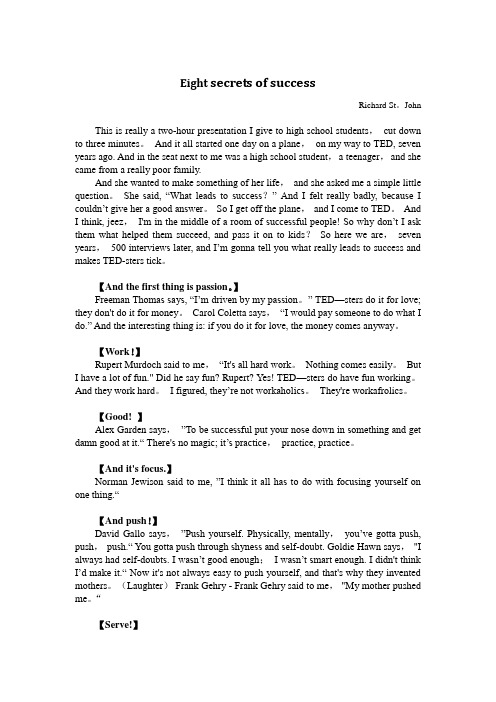
Eight secrets of successRichard St。
John This is really a two-hour presentation I give to high school students,cut down to three minutes。
And it all started one day on a plane,on my way to TED, seven years ago. And in the seat next to me was a high school student,a teenager,and she came from a really poor family.And she wanted to make something of her life,and she asked me a simple little question。
She said, “What leads to success?” And I felt really badly, because I couldn’t give her a good answer。
So I get off the plane,and I come to TED。
And I think, jeez,I'm in the middle of a room of successful people! So why don’t I ask them what helped them succeed, and pass it on to kids?So here we are,seven years,500 interviews later, and I’m gonna tell you what really leads to success and makes TED-sters tick。
- 1、下载文档前请自行甄别文档内容的完整性,平台不提供额外的编辑、内容补充、找答案等附加服务。
- 2、"仅部分预览"的文档,不可在线预览部分如存在完整性等问题,可反馈申请退款(可完整预览的文档不适用该条件!)。
- 3、如文档侵犯您的权益,请联系客服反馈,我们会尽快为您处理(人工客服工作时间:9:00-18:30)。
oilFor the next few minutes, we're going to talk about energy. And it's going to be a bit of a varied talk. I'll try to spin a story about energy, and oil's a convenient starting place. The talk will be broadly about energy, but oil's a good place to start. And one of the reasons is, this is remarkable stuff. You take about eight or so carbon atoms, about 20 hydrogen atoms, you put them together in exactly the right way and you get this marvelous liquid, very energy-dense and very easy to refine into a number of very useful products and fuels. It's great stuff. Now, as far as it goes, there's a lot of oil out there in the world.Here's my little pocket map of where it's all located. A bigger one for you to look at. But this is it. This is the oil in the world. Geologists have a pretty good idea of where the oil is. This is about 100 trillion gallons of crude oil still to be developed and produced in the world today. Now, that's just one story about oil, and we could end it there and say, "Well, oil's going to last forever because, well, there's just a lot of it." But there's actually more to the story than that. Oh, by the way, if you think you're very far from some of this oil, 1000 meters below where you're all sitting is one of the largest producing oil fields in the world. Come talk to me about it. I'll fill in some of the details if you want. So that's one of the stories of oil. There's just a lot of it. But what about oil? Where is it in the energy system? Here's a little snapshot of 150 years of oil. And it's been a dominant part of our energy system for most of those 150 years. Now, here's another little secret I'm going to tell you about. For the last 25 years, oil has been playing less and less of a role in global energy systems. There was one kind of peak oil in 1985, when oil represented 50 percent of global energy supply. Now, it's about 35 percent. It's been declining, and I believe it will continue to decline. Gasoline consumption in the U.S. probably peaked in 2007 and is declining.So oil is playing a less significant role every year. And so, 25 years ago, there was a peak oil just like, in the 1920s, there was a peak coal, and a hundred years before that, there was a peak wood. This is a very important picture of the evolution of energy systems. And what's been taking up the slack in the last few decades? Well, a lot of natural gas and a little bit of nuclear, for starters. And what goes on in the future? Well, I think out ahead of us a few decades is peak gas, and beyond that, peak renewables.Now, I'll tell you another little very important story about this picture. Now, I'm not pretending that energy use in total isn't increasing, it is. That's another part of the story. Come talk to me about it. We'll fill in some of the details. But there's a very important message here. This is 200 years of history. And for 200 years, we've been systematically decarbonizing our energy system. Energy systems of the world becoming progressively, year on year, decade on decade, century on century, becoming less carbon intense. And that continues into the future with the renewables that we're developing today, reaching maybe 30 percent of primary energy by mid century. Now that might bethe end of the story -- Okay, we just replace it all with conventional renewables -- but I think, actually, there's more to the story than that.And to tell the next part of the story -- and this is looking looking out, say 2100 and beyond. What is the future of truly sustainable, carbon free energy? Well, we have to take a little excursion. And we'll start in central Texas. Here's a piece of limestone. I picked it up outside of Marble Falls, Texas. It's about 400 million years old. And it's just limestone, nothing really special about it. Now, here's a piece of chalk. I picked this up at M.I.T. It's a little younger. And it's different than this limestone. You can see that. You wouldn't build a building out of this stuff, and you wouldn't try to give a lecture and try to write on the chalkboard with this. Yeah, it's very different. No, it's not different. It's not different. It's the same stuff, calcium carbonate, calcium carbonate. What's different, is how the molecules are put together.Now, if you think that's kind of neat, the story gets really neat right now. Off the coast of California, comes this. It's abalone shell. Now, millions of abalone every year make this shell. Oh, by the way, just in case you weren't already guessing, it's calcium carbonate. It's the same stuff as this and the same stuff as this. But it's not the same stuff; it's different. It's thousands of times, maybe 3,000 times tougher than this. And why? Because the lowly abalone is able to lay down the calcium carbonate crystals in layers, making this beautiful, iridescent mother of pearl. Very specialized material that the abalone self-assembles, millions of abalone, all the time, every day, every year. This is pretty incredible stuff. All the same, what's different? How the molecules are put together. Now, what does this have to do with energy? Here's a piece of coal. And I'll suggest that this coal is about as exciting as this chalk. Now, whether we're talking about fuels, or energy carriers, or perhaps novel materials for batteries or fuel cells, Nature hasn't every built those perfect materials yet, because nature didn't need to. Nature didn't need to because, unlike the abalone shell, the survival of the species didn't depend on building those materials until maybe now, when it might just matter. So, when we think about the future of energy, imagine, what would it be like if, instead of this, we could build the energy equivalent of this, just by rearranging the molecules differently. And so that is my story. The oil will never run out. It's not because we have a lot of it. It's not because we're going to build a bajillion windmills. It's because, well, thousands of years ago, people invented ideas, they had ideas, innovations, technology. And the Stone Age ended, not because we ran out of stones. (Laughter) It's ideas, it's innovation, it's technology that will end the age of oil long before we run out of oil.Thank you very much.。
